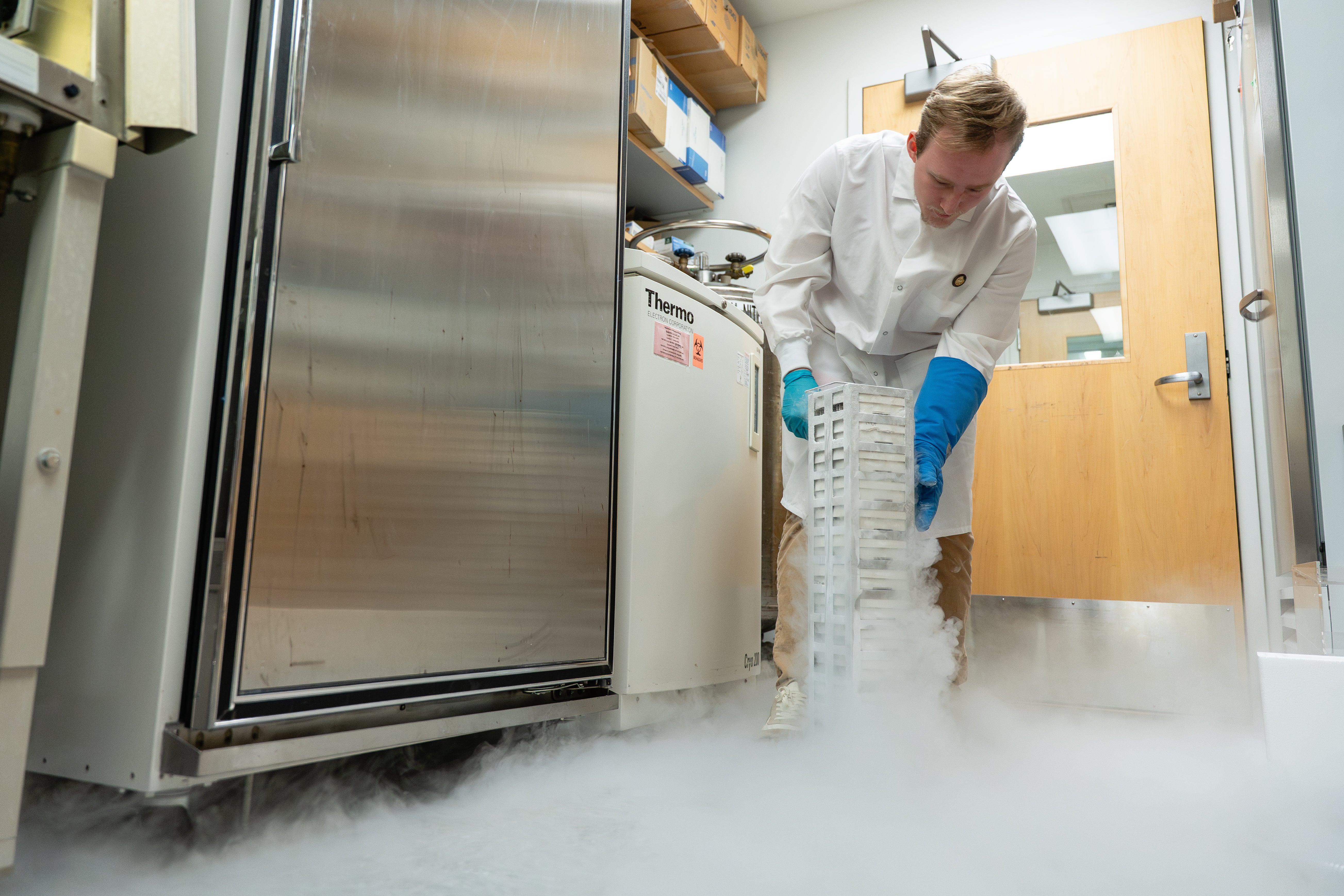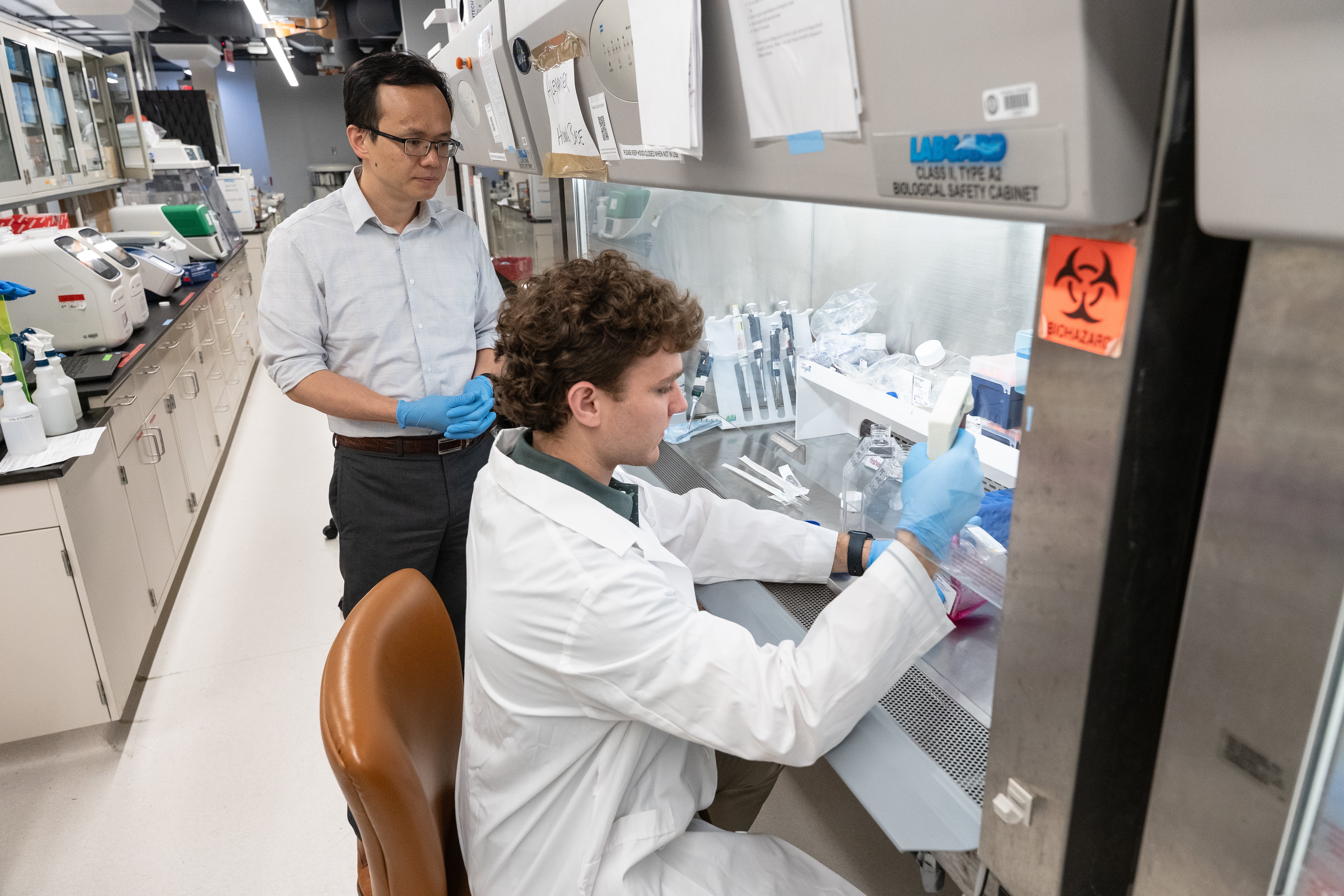 Caption: SURP students Phillip Lavrenyuk (left photo) and Joseph Garzia (right photo) working in their assigned labs.
Caption: SURP students Phillip Lavrenyuk (left photo) and Joseph Garzia (right photo) working in their assigned labs.
By Shannon Turgeon
Photography by Rayni Shiring/University of Pittsburgh
University of Pittsburgh undergrad Joseph Garzia is spending the summer conducting osteoarthritis research in a tissue biology, pathology and engineering lab—and as a result, he is forging a path to his future.
Garzia is one of 31 students from colleges and universities around the country who are living and working in Pittsburgh while completing research through Pitt School of Medicine’s Summer Undergraduate Research Program (SURP).
SURP provides an avenue for undergraduate students interested in biomedical science to gain hands-on laboratory experience before their senior year, while simultaneously helping to further the scientific research already occurring across the School of Medicine. The 10-week program runs from May to the end of July each summer.
“In addition to helping students solidify what it is that they want to do with the next four, five, or six years of their lives, SURP helps them get there. Many students end up in higher tier graduate programs,” said Michael Palladino, professor of pharmacology and chemical biology and chair of the SURP committee, School of Medicine.
SURP is a competitive program: This year’s participants were chosen from a pool of 500 applicants. Nine of them are Pitt undergraduates.
Student Experience
 Caption: SURP student Phillip Lavrenyuk
Caption: SURP student Phillip Lavrenyuk
While in the program, students are paired with a faculty member in the School of Medicine and join research projects in the areas of cell biology and molecular physiology; cellular and molecular pathology; molecular genetics and developmental biology; molecular pharmacology; microbiology and immunology; and molecular biophysics and structural biology.
“For many students, this is their first serious engagement in full-time research,” Palladino said. “Some of them will have done some part-time research at their home institution, but it's really eye-opening for most students when they come here. Pitt is a top-tier research institute. There's a ton going on, and it's an immersive experience,” he continued.
“I get to be in the lab a lot more than I would during the school year,” said Phillip Lavrenyuk, a Pitt undergraduate student participating in SURP this summer. “During the school year, it's maybe 10 hours a week. Now I get a better feel for the schedule, how the work is, and I'm able to do a lot more,” added Lavrenyuk, who is working in the lab of Angela Gronenborn, Distinguished Professor, UPMC Rosalind Franklin Professor, and chair, Department of Structural Biology, School of Medicine.
While completing approximately 400 hours of research, students receive individualized mentoring from School of Medicine faculty and work closely with Pitt graduate students, lab technicians and researchers.
Garzia is participating in SURP 2025 under the guidance of Hang Lin, professor of orthopaedic surgery, School of Medicine, and of bioengineering, Swanson School of Engineering, and principal investigator in the Lin Lab for Joint Tissue Biology, Pathology and Engineering.
“Working with Dr. Lin has been great for the big picture project design and planning. A lot of the actual work has been done with grad students, who have been really helpful,” Garzia said.
Students attend trainings throughout the program focused on topics such as lab safety and sustainability. Outside of the lab, they join weekly professional development meetings hosted by School of Medicine faculty. These range from program-specific discussions to more general lectures on ethics in research or potential scientific career paths.
“After each session, hearing their experiences makes me more inspired to go down the path of research,” said Garzia.
Students are given a competitive stipend and are offered housing for the duration of the program. Social outings, including a Pittsburgh Pirates baseball game and a trip to Kennywood, also allow students to make connections with one another while experiencing Pittsburgh.
Rylee Cisney, a current Pitt doctoral student in the Program for Microbiology and Immunology who participated in SURP in 2021, views the community that she built with the other students as one of the highlights of the program.
“Now I have colleagues and really great friends that are all over the United States working in science, and that connection is going to last forever,” said Cisney.
Moving Forward
 Caption: Former SURP participant and current Pitt doctoral student Rylee Cisney
Caption: Former SURP participant and current Pitt doctoral student Rylee Cisney
Most students who participate in Pitt’s SURP go on to pursue advanced scientific training.
“Almost all of the students make a comment about how valuable the program was and how much they learned, and that it really helped them solidify the direction of their life,” said Palladino.
Participation in the program has also been shown to benefit students when it comes to being accepted into graduate school.
“As a result of their research experience, about half of the students in our program end up coauthoring a paper, which really helps with getting into a top-tier graduate program,” said Palladino.
Many students use connections they have made through SURP for assistance throughout the graduate school application process.
Cisney received a letter of recommendation for graduate school from her mentor, Walter Storkus, professor of dermatology and of immunology, School of Medicine.
“Through SURP, you have this opportunity to get connected to high-ranking, highly established and esteemed professors who will speak well about you. That’s worth everything when you're applying,” Cisney said.
Lavrenyuk, who is planning on applying to graduate school this fall, said that the Pitt graduate students he has worked with this summer are a valuable resource as well.
“They’ve been really helpful in pointing me in the right direction, telling me what I should look for, and how I should be applying,” said Lavrenyuk.
Faculty Benefits
 Caption: Hang Lin, professor of orthopaedic surgery, School of Medicine, and of bioengineering, Swanson School of Engineering, and principal investigator in the Lin Lab for Joint Tissue Biology, Pathology and Engineering, and SURP student Joseph Garzia.
Caption: Hang Lin, professor of orthopaedic surgery, School of Medicine, and of bioengineering, Swanson School of Engineering, and principal investigator in the Lin Lab for Joint Tissue Biology, Pathology and Engineering, and SURP student Joseph Garzia.
SURP doesn’t just benefit the students who participate; the 200+ training faculty members who host students are grateful for the assistance.
“The feedback I get from faculty is that these are amazing students that are recruited into this program, and the students got way more done than they expected. It's a real boost to their lab to push a project forward during the summer with the help of an ambitious young student,” said Palladino.
Almost all the faculty who sign up go on to become repeat mentors and host students for consecutive years. Some have even gained long-term lab members through the program.
“I had a SURP student two years ago in my lab, and he had a great experience,” Palladino said. “He went back to his college, graduated, and decided to get into a PhD program. He applied to Pitt, rotated with me and two other people, and just joined my lab. When I took him for this 10-week program, I didn't do so thinking, ‘Oh, he might be my next great grad student,’ but yet, here we are.”
